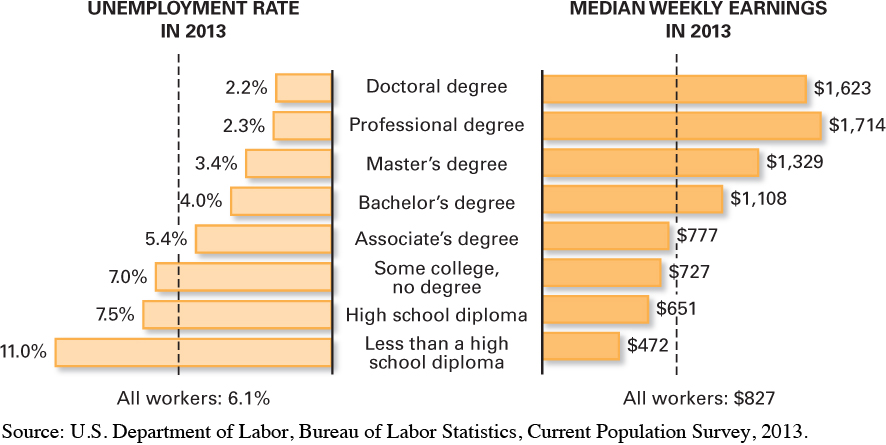THE VALUE OF A COLLEGE EDUCATION
American society values higher education, which explains why the United States currently has more than 4,400 colleges and universities. College is the primary way that people achieve upward social mobility or the ability to attain a higher standard of living. That might accurately describe your purpose for being in college: to attain a higher standard of living. In earlier centuries, a high standard of living was almost always a function of family background. Either you were born into power and money or you spent your life working for others who had power and money. In most countries today, however, receiving a college degree helps level the playing field for everyone. A college degree can minimize or eliminate the restrictions to achievement that stem from differences in background, race, ethnicity, family income level, national origin, immigration status, family lineage, and personal connections. Simply put, college participation is about ensuring that more people have the opportunity to be evaluated on the basis of merit rather than family status, money, or other forms of privilege. It makes achieving the American dream possible.
In 1900, fewer than 2 percent of Americans of traditional college age attended college. Today, new technologies and the information explosion are changing the workplace so drastically that to support themselves and their families adequately, most people will need some education beyond high school. In spite of the fact that today more than 67 percent of high school graduates (approximately 18 million students) are attending college, we are seeing a wave of questions in the media about whether or not college is really worth it.
Rontavius, the student profiled at the beginning of this chapter, likely would answer that yes, college is really worth it, but what do the data say? A New York Times analysis of data from the Economic Institute (epi.org) finds that the answer is “yes.” Dramatic differences exist between the earning power of students with a high school diploma and those with a four-year college degree. In 2013, four-year college graduates earned about twice as much per hour as high school graduates. While there are concerns about the cost of college today, the cost of not attending college is even more dramatic. David Autor, an economist from the Massachusetts Institute of Technology, reported that not going to college will, over your lifetime, cost you about half a million dollars.1
You can also take a look at Figure 1.1 to see how earning a college degree will improve your earning potential. This figure breaks down unemployment rates and weekly earnings according to education level. The more education you have, the more likely you are to be employed, and the higher your earnings will be.
Beyond the financial benefits that earning a college degree gives to an individual, society benefits as a whole when people earn college degrees. College is an established process designed to further formal education so that students who attend and graduate will be prepared for certain roles in society. Today, for many, those roles are found predominantly in what has become known as the “information economy,” which means that most college graduates will earn their living by creating, managing, and using information. For others, college is a crucial way for students to prepare for leadership roles in their communities, companies, professions, or military units.

In SP10 the golf team lost two points because two student-athletes were academically ineligible to compete. However, both of these students earned a retention point for returning to school that semester.
The single-year APR score is calculated by dividing the points earned (34) by the possible points (36). The resulting number (.9444) is rounded to the nearest thousandths and then multiplied by 1000.
The multi-year APR score is calculated by dividing the total points earned over the last four academic years (134) by the possible points (144). The resulting number (.93055) is rounded to the nearest thousandths and then multiplied by 1000.
FIGURE 1.1  Education Pays
Education Pays
Earning a college degree will improve your earning potential. This figure breaks down unemployment rates and weekly earnings according to education level. Use this information as motivation to make the most of college. The more education you have, the more likely you are to be employed, and the higher your earnings will be.
Source: U.S. Department of Labor, Bureau of Labor Statistics, Current Population Survey, 2013.
Another reason students get a four-year college degree is to prepare them to continue their education in a graduate or professional school. If you want to become a medical doctor, dentist, lawyer, or college professor, a four-year college degree is just the beginning, but it is a required step on the path to such professions. Let’s say you aspire to be a pharmacist and are planning to get a bachelor’s degree in chemistry. Your primary purpose for your degree in chemistry is to gain admittance to pharmacy school. Perhaps you have also considered that if your plans should change, having a degree in chemistry will get your foot in the door in several different industries, so another purpose for your degree is having an edge in the job market upon graduation.